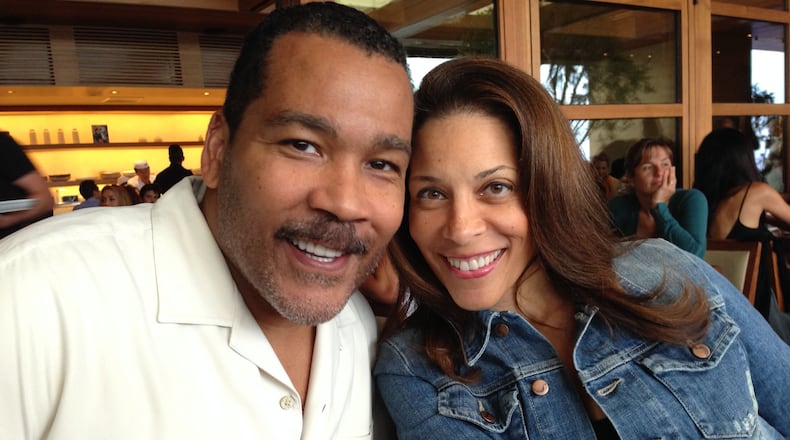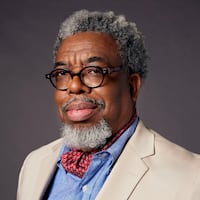On the Friday before he died, Dexter Scott King was working, making phone calls, going over documents, and thinking.
“Over the last six weeks, he was laser-focused on the King legacy and making sure that it was protected into the future. He spent much of his time pouring everything that he had into Bernice,” said his wife Leah Weber King.
But her husband of 11 years was in so much pain. His body, once sturdy and tall, like the former high school football player he was, had grown frail, ravaged by prostate cancer.
“He continued to fight,” Leah said, “until the morning he passed.”
A Man of Privacy
Dexter King, the third of four children of Coretta and Martin Luther King Jr., died of prostate cancer on the morning of Jan. 22, just eight days shy of his 63rd birthday.
Leah and the King family are planning a memorial service for him at 6:30 p.m. on Saturday, at Ebenezer Baptist Church. The celebration will be open to the public.
“I want to reintroduce him to the world,” Leah said. “He has been very out of sight for so long.”
For much of the ‘90s through the early 2000s, Dexter King was the ubiquitous face of the King family dynasty. Handsome like his father and charismatic like his mother, he was placed in charge of protecting his family’s legacy. And as head of the King Estate, he controlled how his father’s image and intellectual property were used.
“Dexter was a forward-thinking person. He was brilliant and I think a lot of his ideas at the time went over the heads of people,” Leah said. “He was talking about technology and interactive experiences.”
With that came pressure from media outlets, corporations and the public, who questioned his methods. There were also well-publicized court battles with his siblings over the direction of the estate.
Leah said it had an impact on him.
So Dexter King virtually vanished.
“The response to him and his ideas wasn’t what he was hoping for,” Leah said. “The easiest thing for him to do was dissolve into the background and still be present in the work.”
Dexter and Leah purchased an estate in Malibu, California. At one point he harbored a desire to get into film— he even played his father in a movie once — but in California, he just decided to relax. He would walk around the hills and beaches wearing a hat.
“He was more comfortable in that space and comfortable being anonymous. It was easy for him to move around because he was very private,” Leah said. “He was just Dexter, the guy that I knew.”
In 2016, Dexter and Leah announced that they were selling their home in Malibu and moving back to Atlanta. But they could never fully pull the trigger, keeping their California home and commuting back and forth.
But people in Atlanta rarely saw him.
“I don’t know if melancholy was the right word, but he cared about what people thought,” Leah said. “He wanted people to understand. I don’t think he felt like he got a fair shake in that.”
Credit: Courtesy of Leah Weber King
Credit: Courtesy of Leah Weber King
Finding Love
Leah Weber had just opened her coffee house, House of Brews, in The French Quarter when she heard Dexter King was coming to New Orleans to promote his 2003 memoir, “Growing Up King.” She needed to create buzz, so she made a cold call.
He showed up.
“He was intriguing and I guess I was intriguing to him,” Leah said. “He was a gentle and quiet man, but his presence was powerful.”
They exchanged numbers and he called a few days later. “He was in California and I was in New Orleans,” Leah said. “So I didn’t put a lot of stock in it.” He kept calling and then invited Leah to come visit him in Malibu, and Leah soon packed up and moved to California.
They were together for 11 years before marrying on July 12, 2013. Leah remembers Dexter woke up that morning and asked if she wanted to go to the courthouse and get married. She said yes, called her mother, and the three of them drove up to Ventura County for a wedding.
“Then we had a beautiful lunch,” Leah said. “It was more about the sacrament than the ceremony.”
She said as a former deejay, Dexter loved hip-hop and got her into it.
“He was always so serious and guarded professionally, but he loved to laugh and have fun,” Leah said.
If there was any conflict in the marriage, it was probably around food. Dexter was a devoted vegan. Leah, well she was from New Orleans.
“He was a fantastic chef and he prepared his own meals,” Leah said. “I am a New Orleanian and I feel better eating meat, seafood and sauces. We worked it out.”
Credit: AP
Credit: AP
An Unexpected Diagnosis
The first symptoms came a little more than three years ago. Dexter went in for a check-up and, according to Leah, was treated for an enlarged prostate.
But something still wasn’t right. About four months later, they went back in for more aggressive testing. An MRI revealed that he did indeed have prostate cancer. It was stage IV and had begun to spread throughout his body.
Jamie Goldman, an assistant professor in the Department of Hematology and Oncology at the Winship Cancer Institute of Emory University, while not speaking specifically on Dexter’s case, said Stage IV occurs when “the cancer has spread outside of the originating site and has spread to other parts of the body.”
She said that studies have shown that Black men often have more aggressive and advanced stages of the disease at the time of diagnosis.
“As with many other cancers, the outcome is better for prostate cancer when it is detected early,” she said. “Five and 10-year survival for males diagnosed and treated for localized prostate cancer is greater than 98%.”
Surgery was not an option for Dexter, so the couple traveled all over the country in search of new treatments. But the cancer quickly spread.
“He is a fighter so he never stopped fighting,” Leah said. “So we fought and were optimistic until we had to deal with the reality of what was happening.”
Leah also says Dexter’s suffering was constant.
“Pain was part of our lives daily,” Leah said.
Credit: Special�
Credit: Special�
Call Bernice
Because he lived in California and was generally private, word of Dexter’s diagnosis never made it back to Atlanta. Finally, Leah called Bernice King, Dexter’s younger sister and CEO of the King Center.
In 2014, the two were at odds over the ownership of their father’s 1964 Nobel Peace Prize and a Bible their father traveled with that was later used by President Barack Obama during his second inauguration. The items were in Bernice’s possession, but Dexter was interested in selling them, as he had done years earlier with the $33 million sale of the King Papers to the city of Atlanta.
In 2016, a judge ruled in favor of Dexter, but the items were never sold.
Publicly the two seemed to be at odds over old legal matters, but Bernice flew to visit him immediately and returned to Malibu later, as Dexter’s condition worsened. Leah said the reunion was “an organic, authentic and moving process between the two of them.”
“They were understanding who each other was and where they were coming from because they are so much alike,” Leah said.
Bernice, in announcing her brother’s death, said the visits were special. They spent hours talking and laughing. He gave her advice and theoretically passed the torch on to her.
“They exchanged feelings and thoughts that healed them both,” Leah said. “They were just missing each other.”
Exhale
By then, the pain was getting worse, deep in his bones.
“Nothing can prepare you for a cancer diagnosis or being on the journey with someone who is fighting for his life, especially at the end,” Leah said. “The pain that it brings... Nobody is ready for that.”
On the morning of Jan. 22, at 2:39 a.m., Leah summoned the nurse, but Dexter was gone.
She said there was a smile on his face.
“I think that he found a lasting peace when he and Bernice reconciled,” Leah said. “He found peace and was satisfied and comfortable. He was able to exhale.”
Shelia Poole contributed to this article.
About the Author
Keep Reading
The Latest
Featured





